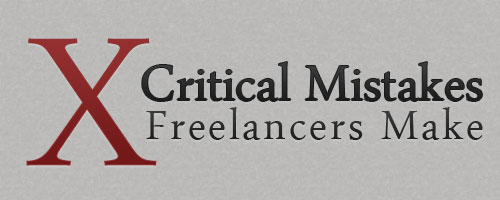Critical Mistakes Freelancers Make
Seeing as we are all human (well, presumably whoever is reading this post anyway), we should recognize that mistakes happen. They even have that saying, “To err is human…,” which goes to show that it is not only commonplace for us to err once or twice: it is expected. But a method is behind this madness, because making mistakes is one of the major ways we learn. This is no different for freelancers.

Finding our way over these bumps in the road often gives us valuable insight to take away. It helps us develop techniques and methods that we can incorporate into our creative process. As freelancers, we have the benefit of access to an entire online community that is willing to share its experiences so that we can learn without having to make the same mistakes.
So in this post, we look at 10 critical mistakes freelancers make. Hopefully, if you haven’t already made one of these mistakes yourself, you can learn the lesson behind it.
Also consider our previous articles:
- Getting Clients: Approaching The Company
- 15 Habits Of Professional Freelancers
- How To Identify And Deal With Different Types Of Clients
- Freelance Contracts: Do’s And Don’ts
- Marketing Rules And Principles For Freelancers
They Don’t Use A Contract
One of the first things freelancers learn when contracting out their services to others is… to use a contract! Unfortunately, we often learn this lesson the hard way. For whatever reason, we think that a particular client of ours is someone we can work for without the aid and protection of a contract. This tends to end in one way: by biting us in the back end.
Without this safeguard in place, you open yourself up to so many potential problems, and you may inadvertently end up committing to more than you had intended or even imagined. Freelancers only make this mistake once, if at all. This lesson is not a secret in the freelance community. The advice comes up often: always use a contract. And many heed the warning once they hear it.
They Misuse Social Media (Or Don’t Use It At All)
Another common, but critical, pitfall that freelancers tumble into is misusing social media, if they even use it at all. Social media is a major tool that offers all freelancers an invaluable resource at their fingertips. An entire community of professionals connected via modems, ready and willing to offer each other whatever assistance they can. Neglecting this stream of industry insight, or not using it properly, can hinder the growth of your business.
Social media is about interacting with people and fostering relationships, which, if done with consideration and attention, can create opportunities you would have otherwise missed out on (not to mention friendships that can outlast jobs). Especially at the beginning of your freelancing career, if you make the mistake of misusing the media, you could be seen as an anti-social pariah in your corner of the Web.
They Put Quantity Over Quality In Their Portfolio

When putting their portfolio together, some freelancers mistakenly believe that the more they add to their portfolio, the better. Then it becomes about quantity and not quality of work. They forget the value of the portfolio in opening doors and creating opportunities.
The phrase “Put your best foot forward” applies in this situation. Your portfolio speaks volumes about your skills, freeing you from having to say too much and risk coming off as more arrogant than confident. Let your portfolio do the talking, and don’t make the mistake of prioritizing quantity and sending the wrong message. Quality makes the best first impression, so make the most of it.
They Stop Learning

This one has to be said. It can do so much harm to freelancers, no matter what their field: that is, they stop learning. But especially for freelancers who work in a field as dynamic and ever-expanding as design and development, staying ahead of the curve is absolutely crucial to meeting your clients’ needs.
This field is continually evolving with new techniques and applications. Throwing in the towel on education is virtual suicide. You, your work and your career would stagnate. Thankfully, with this online culture we have today, cultivating an environment in which we can sustain our education is easy. Not taking advantage of these learning opportunities is a mistake that could potentially cost you your business.
They Don’t Know How To Deal With Clients

Another common mistake is that freelancers forget their people skills when dealing with clients. For whatever reason, we let slip in our minds that clients hire us because they don’t know how to do the work themselves. They are in unknown territory, and as freelancers we should always be sensitive to that and bridge as many gaps in knowledge as we can. This will only improve your future dealings with the client and earn you more respect and trust in the business.
Obviously, without clients, you are a freelancer in title alone, so make sure you know not only how to engage clients but how to entice them back. Being able to assess needs that they aren’t even able to articulate and then communicating it all back to them is an invaluable skill. Neglecting it can be costly.
They Fail To Prepare For Dry Spells

This mistake is definitely better learned second-hand, and that is not preparing for occasions when no work is coming in. Droughts hit even the best of them, especially in these tough economic times. Freelancers often forget to account for that in their pricing structure and to save up in good times for when things go south.
There is a logic behind the rates we charge, and part of it is to sustain us after we have completed work for one client and eagerly await the next. Of course, we can always find work to do, but paying work is what sustains us as freelancers. Calling this mistake costly is too close to punning for comfort, but its impact is definitely felt and could force you to suspend freelancing and seek out supplemental employment, thus making it even harder for you to create your own opportunities.
They Overload Their Plate

This next mistake sometimes results from a fear of the aforementioned dry spell. Of course, greed might also play a role. Whatever the reason, some freelancers don’t know when enough is enough, and they continue to take on new projects as their plate overloads. Overextending yourself and your business like this can destabilize your workflow.
Freelancers need a certain degree of self-awareness to know when they have reached their limit. Reputation—that is, a good one—is important to your business’ development. Spreading yourself too thin is never good, and the distraction could hamper your creativity. This is another of those mistakes that are difficult to recover from.
They Miss A Deadline (And Think It’s No Big Deal)

This, too, is often a consequence of the previous mistake in our list. Falling behind when you are overloaded is all too easy, but missing a deadline can have a debilitating effect on your business. And if you think missing a deadline is no big deal, your career may be over before it begins. Deadlines keep you on track and help you multitask, as well as keep your client on track with the development of their project.
Once again, reputation is critical to building your brand and making your mark in the freelancing market. And a great way to ruin that reputation is by proving yourself unreliable. Stay productive and ahead of your tasks to avoid disrupting your client’s timetable. If you end up making this mistake, own up to it. Don’t offer excuses, simply propose a new timetable and continue working hard to meet it. But clearly acknowledge the problem you have created for your client. If you make this mistake once, you may not have an opportunity to make it again.
They Lack Confidence

Lacking confidence in themselves or in their work is another mistake that can plague freelancers, even beyond their business. Being your own worst critic and holding your work to a higher standard than that of others is natural (right?). But at a certain point, you are no longer critiquing so much as tearing down your work. Dismissing the talent and abilities that have carried you this far is misguided and will do nothing for your productivity.
Without confidence, making it as a freelancer will be extremely difficult. You’ll start taking useful and well-intended criticism bitterly, missing the person’s point and spiraling further into a pool of doubt and self-pity. Lack of confidence hinders your skills and the growth of your business. Clients will pick up on it quickly, because the freelancer is supposed to have a commanding role. Our responsibility is to guide the client to make effective decisions and win them over to our point of view; without confidence, this becomes unlikely. You’ll undervalue both yourself and your work. So have faith in your abilities, and know that your unique voice is needed in the ranks of the freelancing arena.
They Go To Work For Someone Else

Another blunder freelancers make is to work tirelessly to build their business, only to accept the first offer for a cushy job that comes along. No longer being your own boss would seem easy to adjust to, but it can be like moving back under your parents’ roof after you’ve tasted the freedom of living on your own. It simply doesn’t fit as comfortably as it once did. Simply readjusting is not so easy because freelancing is more than a job: it is a way of life.
Some people tell themselves that freelancing was all along a stopgap to some greater dream, but true freelancers find that pill hard to swallow. For some, that might be true, but then those people were not freelancers so much as temporary independent contractors. Freelancers crave the freedom that comes with the ’lancing. Still others believe they can work for someone else and maintain their freelancing on the side. In theory, this might appear viable. The reality is harsher: freelancing is full-time. It is a way of life, and turning it into a part-time job spells trouble.
Further Resources
Have a look at these related articles and resources:
- Three Big Mistakes That Can Make or Break Your Design Career A discussion on Fuel Your Interface of three major mistakes that could potentially end a designer’s career.
- Marketing Rules and Principles for Freelancers Freelance Folder offers some fantastic marketing insight that can help guide you in your freelance career.
- To Err Is Human: How to Handle Freelance Mistakes Freelance Sprout looks at how to handle mistakes as a freelancer.
- Top Ten Mistakes That Aspiring Professional Freelance Photographers Make Paul Burwell offers some helpful advice for photographers who long to branch into the freelancing market.
- Freelancing FUBARs: 8 Common Mistakes Freelance Adviser looks at common mistakes made by freelancers when they are just starting out.





 Flexible CMS. Headless & API 1st
Flexible CMS. Headless & API 1st


